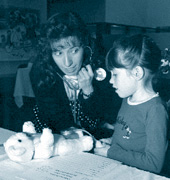 |
 |  |  |
 |
Here, we'll include links on this page to other web pages that describe interesting websites that are great resources. Just click on the graphic to go to the web page: Our Kids.com The Our-Kids Web site is a Family of parents, caregivers and others who are working with children with physical and/or mental disabilities and delays.
The Our-Kids list consist of over 800 people representing children of varying diagnosis; everything from indefinite developmental delays and sensory integration problems, to cerebral palsy, to rare genetic disorders. Over 35 countries are represented on the list now.
Here we can discuss our children's accomplishments and defeats, knowing that the audience includes others who know what we are going through. We can also get some idea of how others address specific problems/concerns with feeding, learning, schools, medical resources, techniques and equipment, as well as describing the problems to friends and family or just coping.

"Catch of the Day"
by Phillip Monroe |
|  |
 |  |  |
 | |
|  |       
 |  |  |
 |
Emotional Healing 
CHILDREN CAN SUFFER FROM POST-TRAUMATIC STRESS
The loss of a loved one or friend can be just as devastating to a child as an adult, yet there has been little research done on the effects of post-traumatic stress reactions in children. The 1995 bombing of the federal building in Oklahoma City, Oklahoma, which killed 167 people, provided researchers an opportunity to study the effects of traumatic loss on children.
The study questioned a sample of 3,218 students enrolled at the Oklahoma City public middle schools and high schools 7 weeks after the disaster about their exposure to the blast, their psychological and emotional responses to it, and whether they were experiencing any distress as a result. When asked if they knew someone killed in the explosion, more than one third said that they had.
After the bombing, children were bombarded with images of the aftermath on television. Nearly three fourths of those children who had lost someone in the blast reported that most or all of their television viewing was related to the bombing.
The study found that youths who had experienced a loss were more likely than those who had not lost a loved one to report symptoms of trembling, shaking, nervousness, and fear. After the explosion, the bereaved children feared for the safety of their family and friends. Seven weeks after the bombing, one third of all children who had lost a parent or sibling said they still did not feel safe, and 75% reported worrying about themselves and their families.
What This Means to You: Although the Oklahoma City bombing was a disaster of epic proportions, loss on any scale can affect your child. Loss of a friend or loved one can lead to stress, fear, and long-term trauma. Talking with your children about their feelings following trauma or loss can be the first step toward healing. Previous studies have indicated that treatment by a trained grief counselor or other mental health professional can also be beneficial in dealing with the emotional responses to loss, and can provide children with the attention they need to cope with their fear and pain.
Source: JOURNAL OF THE AMERICAN ACADEMY OF CHILDHOOD AND ADOLESCENT PSYCHIATRY
click here for a listing of Children's Grief Services A Resource for Helping Children Impacted by Loss Through Death
|
|  |
 |  |  |
|

